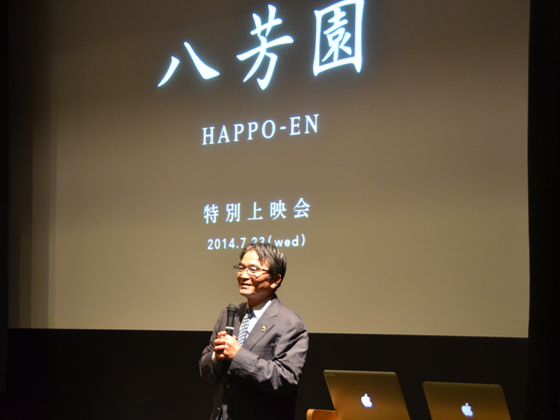Special Screening of the film Happo-en
2014.07.29 | ALL, STUDENT

Happo-en, a short film produced by graduates of Tokyo University of the Arts, under the supervision of Professor Satō Masahiko from the Graduate School of Film and New Media, was selected for the Short Films Competition at the 67th Cannes International Film Festival.
To mark this occasion, on July 23rd, a special screening of Happo-en was held in Lecture Hall I of the Main Building of the Faculty of Fine Arts.
The screening, which attracted enough visitors to fill the entire lecture hall, was opened with an address by President Miyata. After the President’s introduction, Professor Satō and the four graduate students who created the film provided a commentary based on the theme: “Why we were able to go to Cannes.”
While guests at the screening reacted in various ways to the film, which was characterized by the discovery of a kind of newfound boredom, the film was met with a thunderous applause at its conclusion.
Established in 2011 by Professor Satō and four graduate students (current Master’s students), the Happo-en production project was named the “C-Project”; with the aim of creating a film that would be selected for the Cannes (“C”) Festival.
The audience intently listened to the commentary, in which the students explained why they felt their film was accepted at the Cannes. The students explained their unwavering commitment to the film, which was over two and a half years. They continued to motivate themselves by asking, “What do we ultimately want to film?” Working within the unique environment of the university enabled the students to maintain a stoic, non-compromising approach to the project, which ultimately led to its success.
Tokyo University of the Arts will continue striving to support the talents of students into the future.
Happo-en Producer Profiles
◇ SEKI Yūtarō
Born in Kanagawa Prefecture in 1987. Began producing films in 2008. In 2012, his short film Watashi tachi wa sensha o|Ryokō ga shitai received an Outstanding Performance Award at the 2012 Image Forum Festival. That same year, the “Media Practice 2011–2012” website, for which he was in charge of the visuals, was selected by the Jury at the Japan Media Arts Festival. He currently works for the Drama Team of the Production Division of NHK’s Osaka Broadcasting Station.
◇ TOYOTA Masayuki
Born in Kanagawa Prefecture in 1986. Member of the Waseda Film Society since 2008. In 2011, the short film Paternal Womb whose music he was in charge of, was nominated for the Short Film Competition at the 64th Cannes International Film Festival. In April 2013, he started working on the songs and music for the NHK Educational TV program, Kangaeru karasu~Kagaku no kangaekata. In September of the same year, he produced the “Ryōri kuracchi” section of the NHK General TV program Mōsugu! Gochisō san.
◇ HIRASE Kentarō
Born in San Francisco in 1986. Graduated from Keio University Shonan Fujisawa Campus in 2010. In 2012, his production MEDIA PRACTICE 2011–2012 was selected by the Jury at the Japan Media Arts Festival. Exhibited TOKYO 2020 OLYMPIC ZOOMING for the Tokyo Bid Committee’s presentation in Lausanne. Contributed “KOME Album” to the exhibition KOME–The Art of Rice at the 21_12 DESIGN SIGHT exhibition.
◇ ?hara Takayoshi
Born in Kanagawa Prefecture in 1986. Graduated from the Department of Visual Communication Design at Musashino Art University in 2010. Was awarded first prize for his work Numerics in the Exhibition of Graduation Works at the TUA Graduate School of Film and New Media. Contributed Valuer to the Research Associate Exhibition at Musashino Art University (2012 and 2013) and at Fukugan Shikō in 2014.He currently works as an assistant at the Department of Visual Communication Design at Musashino Art University.
◇ SAT? Masahiko
Born in Shizuoka Prefecture in 1954. Professor at Tokyo University of the Arts, Graduate School of Film and New Media. Specializes in methods of education and expression. Developed a new method of expression for video, animation, and graphic design based on the theme, “How can we convey to others?” Conducts interdisciplinary research, including studies of expression based on findings in the field of neuroscience.
His major works include the educational programs “Pitagora Switch,” “2355/0566,” and “The Thinking Crow” (Kangaeru karasu). His major publications include Satō masahiko zenshigoto (Madora Shuppan), Keizaitte souikotodattanoka kaigi, (joint publication; Nikkei, Inc.), Kangae no seiton (Kurashi no Techo), and IQ PlayStation software. History of awards: Asahi Advertising Award; ADC Grand Prix Award; ADC Grand Prix Award; Creator of the Year in 1991; New York ADC Gold Award; Mathematical Society of Japan Award for Publishing in 2011; D & AD Award for AY 2012; Art Encouragement Prize in 2011; Purple Medal Ribbon for AY 2013.






